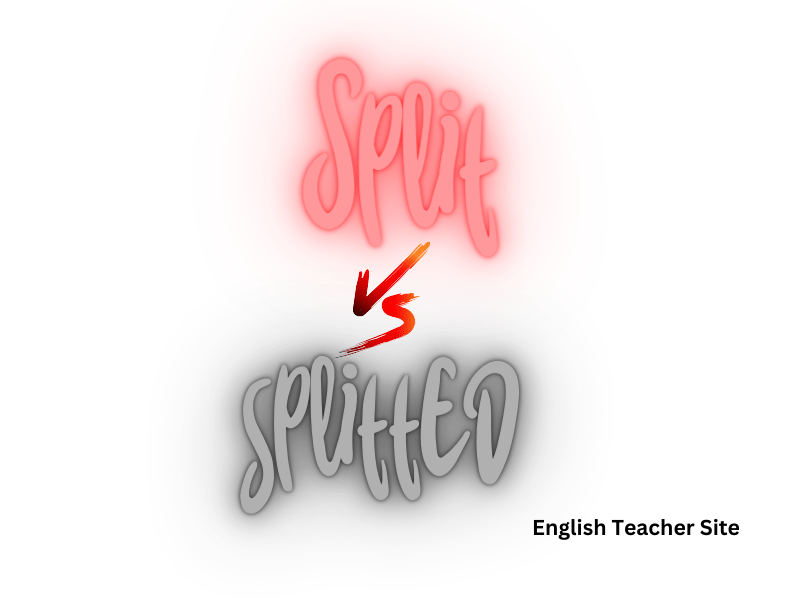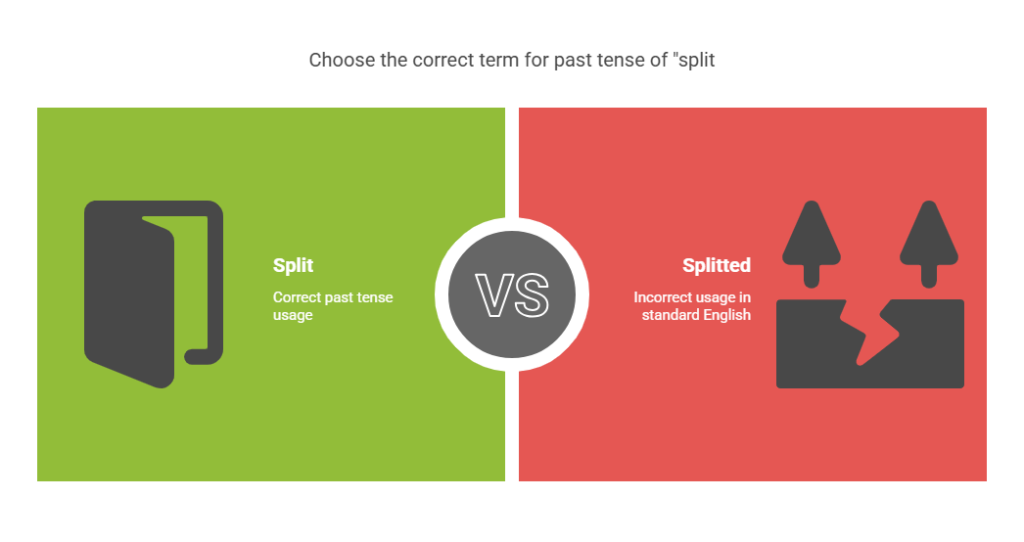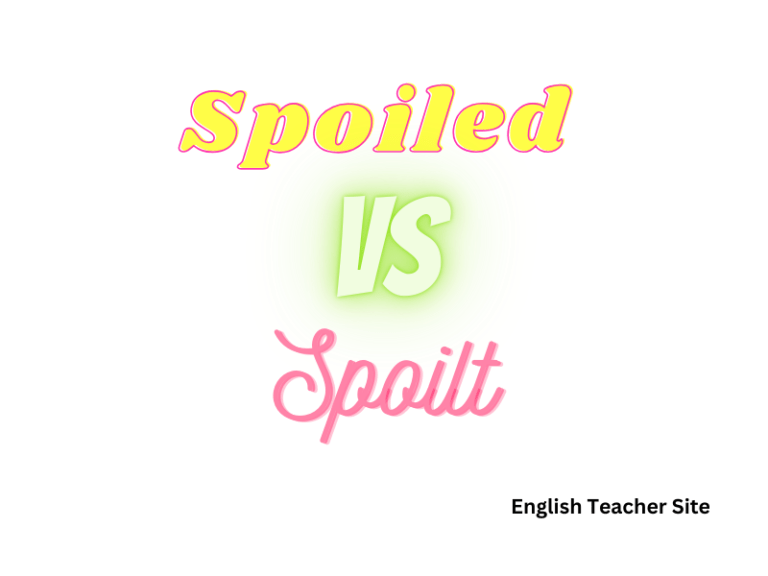Split vs Splitted: Which One Is Actually Correct?

What’s the Confusion About Split vs Splitted?
Answer: Correct one is “Split”
The confusion between split and splitted is a prime example of how irregular verbs can challenge even seasoned English speakers. The core of the problem lies in the irregularity of the verb split. English, being a language that is constantly evolving, holds many exceptions to its grammatical rules. While most verbs follow the standard -ed rule to indicate the past tense, irregular verbs like split refuse to adhere to this simple pattern. For anyone familiar with the standard past tense formation, it might seem only logical to apply the -ed suffix to split, thereby creating splitted. But this assumption doesn’t hold in English grammar.
Understanding the Verb Split
The Meaning and Usage of Split in Modern English
Split is a versatile verb in modern English, primarily meaning to divide or separate something into parts. This can apply to physical objects, such as splitting wood or a log, or abstract concepts, like splitting an opinion or decision. The word is used in various contexts, from casual discussions to more formal discourse, making it an essential verb in the English language. Its flexibility, coupled with its irregular form, means that understanding its usage is crucial for accurate expression.
Is Split an Irregular Verb? Here’s the Breakdown
Indeed, split is classified as an irregular verb. Unlike regular verbs, which typically follow a predictable pattern in the past tense (for example, walk becomes walked), irregular verbs deviate from this norm. Split retains the same form for its past tense and past participle, which is the root of much confusion. To form sentences in the past, present perfect, or passive voice, the same form of split is used. For example, “He split the wood” in the past tense and “The wood was split” in the passive voice both use split without change. This pattern is a defining feature of irregular verbs.
Split in Past, Present, and Future Tenses Explained
One of the key attributes of split is that it does not change across tenses. Whether discussing an action in the present, past, or future, the verb form remains identical. In the present tense, split is used as in, “They split the profits.” In the past tense, it remains split, as in, “They split the profits yesterday.” The future tense is formed by adding auxiliary verbs, not by changing the form of split: “They will split the profits tomorrow.” This consistency is what sets irregular verbs like split apart from regular verbs.

Grammar Rules You Need to Know
Past Tense and Past Participle of Split Made Simple
The past tense and past participle of split are both split. This is the core rule to remember: there is no splitted in standard English. Understanding this rule is essential for crafting grammatically correct sentences. For example, “She split the pie” (past tense) and “The pie has split” (past participle) both use split. Once you’ve internalized this rule, avoiding errors becomes significantly easier.
Why Split Remains the Same in Every Tense
The reason split remains unchanged across all tenses is because it is classified as an irregular verb. Irregular verbs don’t follow the usual -ed rule for past tense formation. Instead, they maintain the same form regardless of tense. For instance, put, cut, and split all retain their base form for the past tense and past participle. This irregularity is simply a feature of the verb’s evolution in the English language.
Examples of Split Used Correctly in Sentences
- Present: “I split the bill with her.”
- Past: “They split the cost of the dinner.”
- Future: “I will split the responsibilities with you.”
Common Mistakes and How to Avoid Them
Phrases and Contexts Where Writers Get It Wrong
Writers often fall into the trap of using splitted when discussing past actions, especially in casual or less formal contexts. Sentences like, “I splitted the document,” or “She has splitted the information,” are both grammatically incorrect. The correct forms would be, “I split the document,” and “She has split the information.” To avoid this mistake, always remember that split does not change.
Simple Tips to Use Split with Confidence
The key to using split correctly is repetition. Practice writing and speaking with split in different tenses to internalize its form. Once you are familiar with the consistency of split, you will avoid mistakenly using splitted. Regularly revisiting irregular verbs and their unique patterns will also sharpen your grammatical understanding and writing accuracy.
Quick Reference Guide
Split vs Splitted at a Glance
- Correct: Split (used in the present, past, and past participle forms)
- Incorrect: Splitted (should never be used in standard English)
Easy Examples for Immediate Clarity
- “I split the cost with him.”
- “They split the decision.”
- “We have split the group into two parts.”
Mastering Split vs Splitted for Clear and Correct Writing
Only split is correct in all forms. There is no place for splitted in proper English usage. Understanding this distinction ensures clarity in writing and speaking.
Final Tips for Avoiding Common Grammar Errors
To avoid errors with split, remember that its form does not change, no matter the tense. Practice makes perfect, and by consistently using the correct form in both writing and speech, you will solidify your understanding of this important irregular verb. Mastering these subtle grammatical nuances will enhance your confidence and professionalism in language use.
Source
Harper, Douglas. “Etymology of split.” Online Etymology Dictionary
My name is Khamis Maiouf. I am the creator of the English Teacher Site, dedicated to providing valuable resources and insights for students around the world. With a passion for education and a commitment to helping students enhance their skills, I aim to make English teaching more effective and enjoyable for both educators and students.






